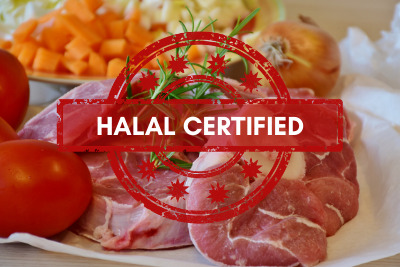
Halal meat is eaten by Muslims all over the world, although there might be a reason for this. While meat is the most debated category of food ingested, Halal includes more than just meat or even the type of meat eaten. If you really care for animal welfare and want to know the animals are healthier for eating, those that died through Electrical Stunning/ Gas Stunning/ Percussive Stunning or those that were slaughtered in a halal manner, then investigate the matter scientifically, even if you are not a scientist.
The halal process effectively drains the majority of the blood from a slaughtered animal, which is essential if the meat is to be tender. In jhatka, the dangers of clot formation are higher. If the meat is left uncooked for a few days, it can become rotten. It can also make eating the meat harder. According to others, livestock slaughtered by jhatka suffer more trauma than those slaughtered by halal.
People say that animals slaughtered by jhatka undergo more trauma than those slaughtered by halal. The less an animal suffers, the higher the quality of the meat. When animals are subjected to pain, the glycogen content in their muscles is stimulated, causing the meat to become tough. The agent that causes rigour mortis is stored glycogen (or, stiffening of muscles on death).
Since the heart manages to beat for a few seconds after death, several contaminants are ejected from the animal's arteries, making Halal deemed healthier. Since not all of the blood is lost in jhatka, the meat is tougher and drier.
It is claimed that the blood contains toxins, germs, and bacteria that, if kept within the animal's body, could cause humans ill. Fresh Halal mutton has many advantages. It has less blood, which means less chance of food poisoning and infection, stays longer in the freezer, foods taste great, are healthy, and you are safe from diseases. It could, at the very least, render the cooked meat quite tough. Cooking and eating fresh halal chicken or mutton results in a nutritious meat with a tender texture and tasty meat. Many people believe that jhatka is only available in the northern Indian market, despite the fact that it is halal in the rest of the country.
Having Halal meat not only ensures that the customer is enjoying a nutritious and balanced meal at the end of the day, but the whole procedure is very humane since the livestock are not subjected to an agonisingly stressful process. As a result, the idea of eating Halal meat is beneficial to anyone who wants to live a healthier life, not only practising Muslims.
Fish, poultry, and eggs are your health's best mates, and you can now save time and effort by having halal meat delivered to your doorstep! You can make better decisions by purchasing meat online from Ghiza Foods. Have the freshest sustainable foods, poultry, and rare meat types delivered to your door in just 45 minutes. Through us, you will avoid the inconvenience of shopping at dusty local markets, searching for particular days, and the overall unpleasantness of the experience!
The unsanitary conditions, crowds, and noise make it a very uncomfortable experience for people, including women. Washing and cleaning meat seems to be a whole new headache! Picking off scraps of wood, mud, and dirt that have stuck to it is a waste of time. If you can relate to all of these, we have a brilliant solution for you: you can take responsibility and have total freedom in buying meat without relying on others. Ghiza Foods halal meat near me is a one-stop online meat seller where you can order meat and get it delivered to your door, all from the comfort of your smartphone. We have anything a non-vegetarian connoisseur might like, whether it's chicken, lamb, or fish. We clean the meat thoroughly and break it into the desired parts or groups before packing it for secure delivery right to your house.
Be wary of the own butcher
You've seen the gruesome carcasses dangling around, offering the appearance that the meat is still new. Butchers do a lot of 'window dressing,' as we want to term it, which involves turning brown meat around, trimming off the fat, and dabbing away the dreaded red liquid. Meats usually last 3-5 days in the refrigerator at temperatures of 30 to 40 degrees. Similar foods, such as lamb, ham, and beef, have different shelf lives. As a result, you can consider if the meat is fresh off the carcass.
And all of you who follow religious guidelines and consume only ‘Halal' cut meat, it is important to ensure that your butcher is providing you with the same. The fact is that you'll never know for sure, and he's possibly just offering you Halal cut meat to sweeten the bargain!
It's bad enough that you have to wait in long lines to get to the counter, but do you even realise what's going on in the back of your butcher shop? What new species of lethal bacteria are being born in the back of your butcher's den, how sterile is he holding it... Okay, maybe we're going a little too far, but cleanliness and hygiene should be at the top of the butcher's goal list... If it isn't, you may as well be dead meat!
That is why, when it comes to purchasing meat, you need someone you can depend on, someone who can provide you with the freshest, best quality meat without leaving you in the dark.